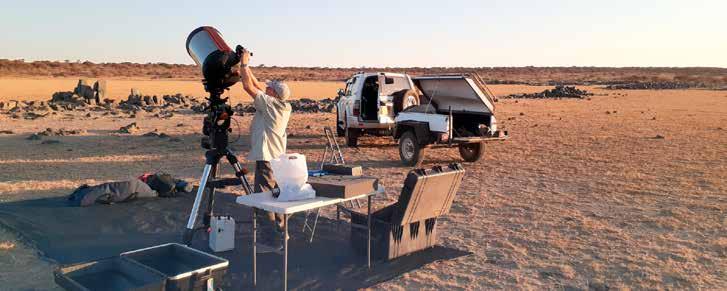
3 minute read
ASTRONOMICAL SOCIETY OF BOTSWANA
ASTRONOMICAL SOCIETY OF BOTSWANA MAKES ASTRONOMY SEXY FOR GENERAL PUBLIC
By: Keletso Thobega
Advertisement
Most things in the universe happen over millions or even billions of years but some things change on the timescales of human life and can be seen to change in a matter of months, days, or even seconds. These are some of the most extreme events in the universe, things like the collapse of a dying star, or a collision of two massive objects. Human beings have been observing astronomical transients for centuries, from supernovae to gamma ray bursts and gravitational waves.
In 2007, scientists discovered a new type of transient called fast radio bursts – bright radio pulses that last only a few milliseconds. All these observations and findings of the astronomy make it an interesting field to explore.
Their origin is one of the newest unsolved mysteries of astronomy. Botswana is a country that offers many opportunities for clear viewing conditions because of its climate and weather, which is bright and clear most times. In Botswana, the rainy season begins in October and finishes in April, and the months in between leave little to no rain, which results in clear night skies which are ideal for for astronomical observation, says the chairperson of the Astronomical Society of Botswana,
Answers to the quiz on page 40
1-D, 2-A, 3-A, 4-C, 5-D, 6-B, 7-B, 8-C, 9-B, 10-B, 11-A, 12-B, 13-A, 14-A, 15-C, 16-C, 17-C
Dr Moletlanyi Tshipa.
Dr Tshipa obtained both his MSc and PhD in Theoretical Physics from the University of Botswana in 2008 and 2018, respectively. He has worked as a teacher and demonstrator. As a theoretical physicist, his research interests include Quantum Mechanics, Particle physics, string theory, M-theory, quantum gravity and cosmology. One of his contributions is his Photonology theory, which suggests that physical matter consists of light.
He has been with the association since its inception and has developed a passion for creating public awareness on astronomy. He explained that the aims and goals of the association include creating opportunities and platforms to connect astronomy enthusiasts, enhance personal knowledge and professional development in astronomy in Botswana, and also create platforms for public talks, seminars and outreach programmes. They also create opportunities for fun social events, local and regional universities and organisations, and organises membersonly networking events with regional universities and international organisations.
“Astronomy offers great potential to expand and diversify the market with minimal environmental impact. With access to some of the darkest and driest skies on the planet – a completely free resource – astro-tourism is a relatively easy way for tour guides to complement their earnings. It also presents an opportunity to preserve the indigenous stories about the star, such as those of Basarwa and other tribes who are in touch with the field of astronomy, before they are lost,” he said. such as the Africa Millimetre Telescope, which is on the horizon, as it offers opportunities for astronomy education and create opportunities for opportunities for sustainable socio-economic growth.

Astronomical Society of Botswana website gallery.
Last year, ASB hosted some interesting events that include an astronomical viewing platform session at Mokolodi, held under the theme: ‘Mokolodi Astronomers Reaching for the Stars.’ It was during this event that Southport Astronomical Society of the U.K. donated a telescope to the Society.
Earlier in the year, at the request of the Astronomical Society of Botswana, Dr Fulvio Franchi from the Botswana University of International Science and Technology (BUIST) gave a presentation on the tracking of a meteorite that landed in Botswana in 2018, and how they eventually recovered pieces of it in the Central Kgalagadi Game Reserve after several expeditions.











